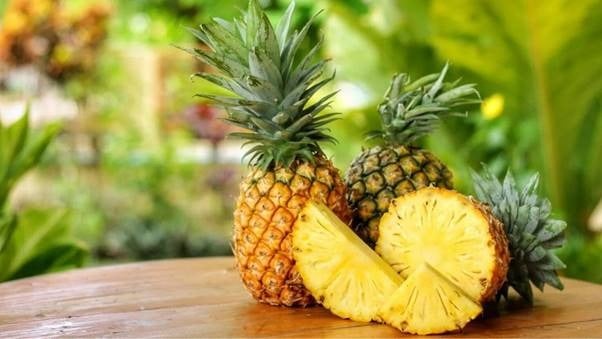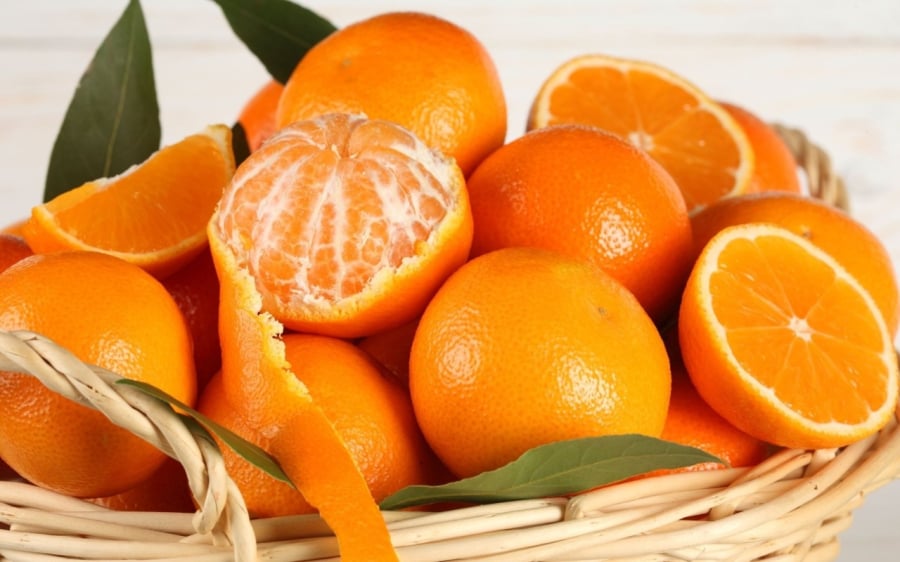1. Pineapple
Pineapple, also known as sweet pineapple in Vietnamese, is a tropical fruit with a distinctive sweet taste and aroma. With its unique shape and golden color, pineapple is not only loved for its delicious flavor but also for its visual appeal. This fruit is packed with vitamin C and antioxidants, making it a nutritious and appealing treat.
Pineapple is often avoided on altars due to the similarity in pronunciation between the words “pineapple” and “deaf” or “sever” in Vietnamese. In folk belief, placing pineapple on an altar could bring bad luck or hinder the work or career of the household. Therefore, despite its delicious taste and attractive appearance, pineapple is traditionally avoided on ancestral altars.

2. Oranges
Oranges are one of the most popular fruits, known for their refreshing sweetness and pleasant aroma. They are loved not only for their delicious taste but also for their high vitamin C content, which boosts immunity and improves overall health. With their round shape and vibrant color, oranges make a delightful addition to meals and special occasions.
In the past, oranges were often avoided during ancestral worship due to the similarity between the word “orange” and the word “difficult” in Sino-Vietnamese. In Eastern culture, offering oranges can be seen as bringing bad luck, especially during ceremonies and holidays when people wish for good fortune and prosperity for themselves and their families.

Oranges are a popular choice for their sweet taste and pleasant aroma.
3. Strongly scented fruits
Durian and jackfruit, despite their delicious taste, have a strong and pungent odor that can disrupt the tranquility and purity desired in a worship space. For this reason, these fruits are not used to worship Buddha, deities, or ancestors.
4. Bitter, sour, and spicy fruits
Homeowners should avoid choosing bitter, sour, and spicy fruits such as tamarind, bitter melon, chili peppers, green tea apples, and star fruit for their fruit offerings. These fruits often evoke memories of life’s challenges and bitterness. To avoid bad luck, it is best to refrain from offering these fruits.
5. Artificial fruits
During daily incense burning and worship rituals, artificial fruits should never be used, even for cost-saving reasons, as this may affect the homeowner’s fortune. In folk belief, ancestors only “eat the essence” of the offerings, so fresh and fragrant fruits are preferred.
Bruised or damaged fruits: Offerings for worship should always be of the highest quality. While you don’t need to choose expensive fruits, it is essential to ensure their freshness. Using bruised or rotten fruits for offerings is considered disrespectful and inappropriate.
The Ultimate Guide to Cooking Catfish in a Pineapple Sauce: A Delicious and Hearty Meal for a Rainy Day
“A mouthwatering treat awaits! Get ready to indulge in a delicious masterpiece with this easy-to-follow guide to creating the perfect catfish braised in pineapple right in the comfort of your own home. Impress your taste buds and transport yourself to a tropical paradise with this unique and flavorful dish.”
The Ultimate Guide to Pineapple Preparation: Soak It in a Special Solution to Avoid a Tingling Tongue.
Pineapple is a delicious tropical fruit with a unique tangy-sweet flavor. While it is a tasty treat, the tangy taste can sometimes be a bit too much, leaving your tongue feeling tingly and uncomfortable. But fear not, with a simple trick, you can enjoy this exotic fruit without the tingly after-effect.






































